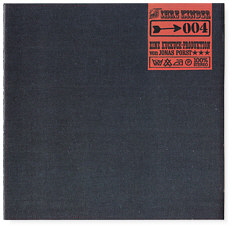
Das dritte Album der Nürnberger Gruppe „Ihre Kinder” hatte auf dem Cover keinen Titel vermerkt und wurde deshalb oft nach der Bestellnummer des Vertriebs als „2375 004” benannt oder nach dem Material der Hülle als „Jeans-Cover” bezeichnet. Viele Kenner der Rockszene sehen in diesem 1970 erschienenen Album das beste der Gruppe. „Ihre Kinder” waren auf dem Höhepunkt ihrer Bekanntheit angelangt.
„2375 004” hatte eine erhebliche Bedeutung bei der Entstehung der Krautrock-Szene. Das Album verband Elemente des amerikanischen Protestsongs, weißen Blues, vorsichtig dosierte erste elektronische Akzente und Rock in einer Form, die man in Deutschland bis dato nicht gehört hatte.
In gelungener und allerdings auch zeittypischer Weise nehmen sich die deutschen Texte Problemen an wie Überbevölkerung und Anonymität („Menschen wie Sand am Meer”), Armut im Wohlfahrtsstaat („Straßenkind”), Atomrüstung („Toter Soldat”) oder Drogenmissbrauch („Weißer Schnee, Schwarze Nacht”).
Insbesondere die ruhigen Songs klingen immer noch interessant und hörenswert. Im mehr als sechseinhalbminütigen „Toter Soldat” beschreiben „Ihre Kinder” die Perversität des Krieges im nuklearen Zeitalter und produzieren mit einer verzerrten Orgel, elektrischer Gitarre und Trommelwirbel eine bedrückende, in ein Nichts führende Atmosphäre.
„Weißer Schnee, Schwarze Nacht” ist musikalisch und textlich der deutsche Vorläufer von „Sister Morphine” (Rolling Stones, 1971) und „The Needle and the Damage Done” (Neil Young, 1972). Sonny Hennigs Gesang ist zwar eigentümlich, aber wirkt in diesem Stück anrührend. Die Texte waren zu der Zeit mit die anspruchsvollsten, die es in der deutschsprachigen populären Musik gab.
Die CD-Ausgabe ist nur teilweise gelungen. Der Sound ist etwas basslastig und der Flyer doch recht minimalistisch geraten.
Peter Eisenburger, 3. September 2010.
English version
The untitled album with the order number 2375 004 (often called „Jeans-Cover” because it was not packed in paper but in jeans cloth) is by most observers seen as the best record of Ihre Kinder and marks the peak in their public awareness. „Jeans-Cover” was most important in the evolving „Krautrock” scene. This album had a musical blend between American protest song, white blues and carefully set elements of electronic rock and jazz, which had not been heard in this form and to this date in Germany.
In an excellent way the songs take up political and social problems of the time like overpopulation and anonymity („Menschen wie Sand am Meer”), outsiders in the welfare state („Straßenkind”), nuclear armament („Toter Soldat”) or drug misuse („Weißer Schnee, Schwarze Nacht”). Especially the calm songs still sound well and interesting. In the more than 6 and a half minute long „Toter Soldat” Ihre Kinder describe the perversity of warfare in a nuclear world and produce an oppressed atmosphere with distorted organ and electric guitar chords and drum rolls that lead into nothingness. „Weißer Schnee, Schwarze Nacht” is in musical and lyrical terms the German predecessor to the Stones’ "Sister Morphine" (1971) and Neil Young’s "The Needle and the Damage Done" (1972). Sonny Hennig’s singing may be peculiar but still is touching here. His lyrics were seen as the most sophisticated in German popular music these days.
The transfer of the music to CD has not been well done. The booklet is minimalistic and doesn’t mention any names of producers or engineers or a year of the CD release. Whoever these people were they couldn’t stand the temptation to adjust the songs to „modern taste” by emphasizing the rhythm section and so falsifying the original sound. Further the heights (especially the hi-hats) clank that it almost gives you pain in the ears. Also the digitizing didn’t do any good to Sonny Hennig’s voice.
An essential addition to any collection of German popular music.
Peter Eisenburger, 20th August 2005.

Hochgeladen am 13. November 2021. Zuletzt aktualisiert am 9. August 2023.

